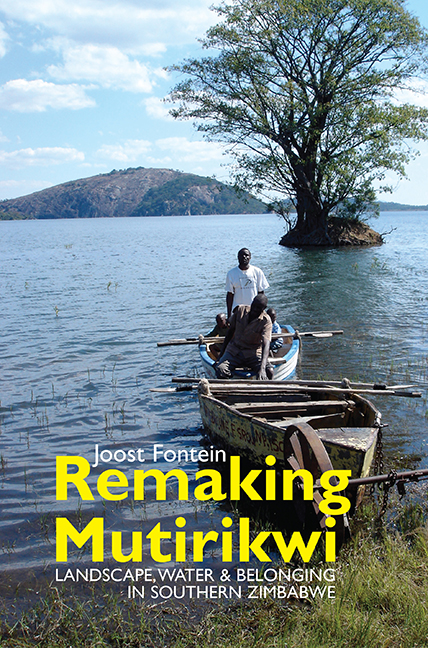Book contents
- Frontmatter
- Dedication
- Contents
- Illustrations
- Acknowledgements
- Note on Fieldwork, Notes & Sources
- Glossary
- Acronyms & Abbreviations
- Chronology
- Remaking Mutirikwi: An Introduction
- Part One Remaking Mutirikwi in the 2000s
- Part Two Damming Mutirikwi 1940s–1990s
- Epilogue: Remaking Mutirikwi in the late 2000s & early 2010s
- Bibliography
- Index
- Eastern African Studies
4 - Hippos, Fishing and Irrigation
Published online by Cambridge University Press: 11 June 2021
- Frontmatter
- Dedication
- Contents
- Illustrations
- Acknowledgements
- Note on Fieldwork, Notes & Sources
- Glossary
- Acronyms & Abbreviations
- Chronology
- Remaking Mutirikwi: An Introduction
- Part One Remaking Mutirikwi in the 2000s
- Part Two Damming Mutirikwi 1940s–1990s
- Epilogue: Remaking Mutirikwi in the late 2000s & early 2010s
- Bibliography
- Index
- Eastern African Studies
Summary
If the politics of rain discussed in the previous chapter illustrate how water can index the contested play of sovereignty and legitimacy in ongoing reconfigurations of traditionalist rule, then a similar argument can be made for other, more technocratic regimes related to water around Mutirikwi. Continuing official insistence upon the prevention of soil erosion and dam siltation is an example I have already discussed, which too involves performances of sovereignty alongside more productive mechanisms of power shaping political subjectivities and regimented landscapes amid appeals to developmentalism and governmental legitimacy. Such technocratic regimes exist in close proximity to and intertwine with the politics of rain and the ritual protection of sacred places through chiefs long charged with ensuring adherence to soil conservation strategies1 even as they lead government-sponsored national biras (ancestral possession ceremonies). So-called traditionalist and technocratic regimes of rule entangle across various levels, and chiefs, mediums, war veterans, new farmers and others can be simultaneously involved in rain making and technocratic soil conservation without contradiction, because all gain traction through the material potentialities of water and land.
The significance of soil conservation strategies for my larger arguments about the political materialities of land and water in Zimbabwean state-making, and the entanglement of multiple regimes of rule and registers of meaning through the active remnants of past landscape interventions, are hard to exaggerate. It reappears repeatedly in the literature (Drinkwater 1989; Scoones and Cousins 1991; Scoones 1997; Beinart 2000; Moore 2005; Alexander 2006; McGregor 1995b), and throughout this book. This chapter, however, focuses on two other concerns to do with water that were salient around Mutirikwi in 2005/06: local demands for access to fishing and for irrigation from the lake's waters. Like rain making and national biras, both gained particular renewed efficacy in the context of recurring drought and economic crisis, even as they recalled the contested aspirations and imagined futures entangled with Rhodesia irrigation planning and the remaking of Mutirikwi's landscapes in the 1950s and 1960s, which are discussed in later chapters.
Irrigation, soil erosion and even fishing point, like rain, to water's productive and excessive/destructive material potentialities. Like rain making, regimes of rule to do with irrigation, soil erosion and fishing are charged with optimising and minimising water's productive and excessive potentialities respectively.
- Type
- Chapter
- Information
- Remaking MutirikwiLandscape, Water & Belonging in Southern Zimbabwe, pp. 112 - 138Publisher: Boydell & BrewerPrint publication year: 2015



